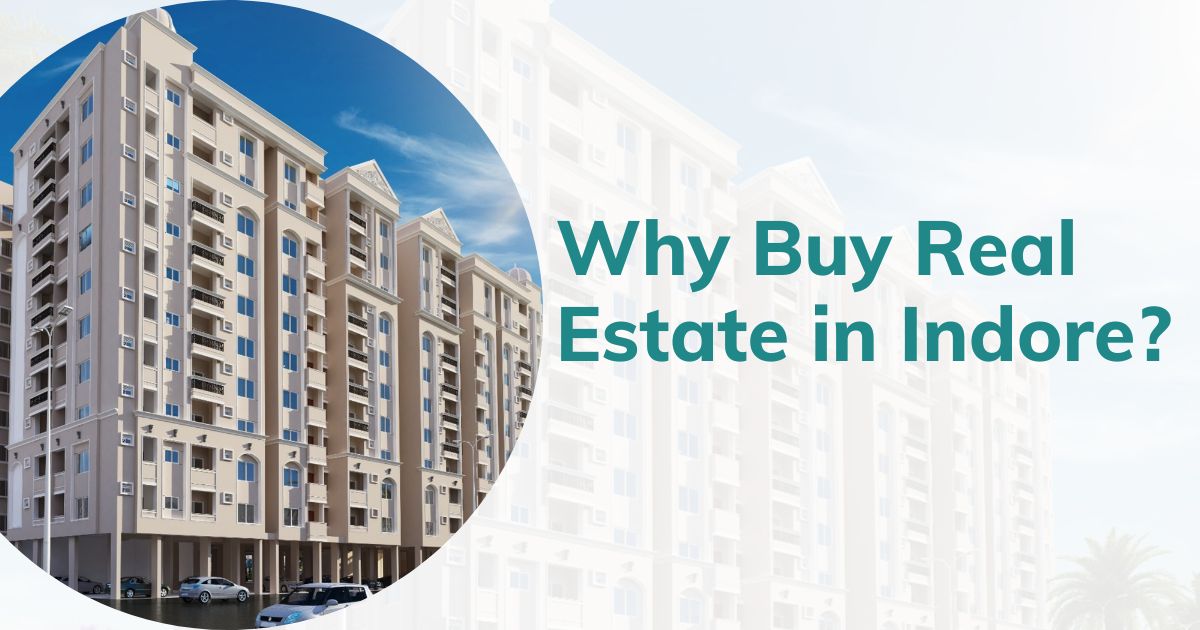



The city of Indore has steadily emerged as a compelling destination for residential property investment and home-ownership. With its strategic location in central India, improving infrastructure, strong employment generation and relatively affordable prices, Indore offers multiple advantages to home-buyers and investors alike. Below we explore the key reasons, backed by data, why buying real estate in Indore today makes sense.
1. Strong Growth & Investment Potential
Indore’s real estate market is showing impressive momentum. For instance, the city accounted for approximately 40% of all registered real-estate projects in Madhya Pradesh during 2023–24, leading the state by a wide margin. (Prop News Time)
Further, according to market-reports, property values in many prime areas of Indore have appreciated at rates between 10%-20% annually, with some pockets even higher. (lashkariproperties)
In the plot-segment, Indore-led Tier-II cities had launches of over 26,000 residential plots in recent years, reflecting strong investor interest. (Business Today)
These figures show that buying real estate in Indore isn’t just about a home, it can also be a smart investment for the future.
2. Affordability + Value for Money
Compared to major metros, Indore offers significantly better affordability for comparable living standards. One report notes that residential plots or housing in Indore still cost far less per sq ft than in large metro cities.
For example, in key localities, average property price may be around ₹4,600 to ₹5,500 per sq ft in 2025.
This affordability means that buyers can access quality homes without the extreme premiums often seen in Tier-I markets. For many, this cost-benefit equation is a major reason to buy in Indore now.
3. Infrastructure & Connectivity Boost
Indore is undergoing a transformation in terms of infrastructure and connectivity — key drivers of real-estate value.
— The planned metro rail project (around 31.5 km) will enhance city-wide connectivity and is expected to uplift property values along its corridor by 15–20% or more.
— Smart-City initiatives and major highway expansions are in place, boosting livability and access in emerging localities.
Such infrastructure upgrades mean that buying now could benefit from improved accessibility and higher appreciation over time.
4. Growing Employment & Economic Base
A vibrant economy supports housing demand — and Indore is showing signs of such growth. With a mix of manufacturing, IT/ITES, education and healthcare sectors expanding, the demand for quality residences is rising.
As employment options expand and new households form, demand for homes increases — not only for self-use but also for rentals. This dynamic supports long-term value in real-estate purchases.
5. Quality of Life & Sustainable Urban Living
Another reason to buy in Indore is its strong livability credentials:
— Indore has repeatedly been ranked India’s cleanest city under the Swachh Survekshan survey for several years.
— The city offers relatively lower living-costs, good education and healthcare infrastructure, and a growing lifestyle ecosystem.
For home-buyers seeking comfort, convenience and a healthy environment — not just investment upside — Indore ticks many boxes.
6. Diversified Property Options
In Indore you’ll find a range of property types: affordable apartments, mid-segment homes, plotted developments and premium residences.
For example, plots are increasingly popular: in 2024, average launch price of plots in some Tier-II cities (including Indore) reached ₹3,679 per sq ft in that segment.
This variety enables buyers to match the housing type with their budget, lifestyle and investment horizon — not everyone needs luxury villas; there are prudent options accessible too.
7. Timing is Favorable
Given that property values are appreciating and infrastructure upgrades are ongoing, buying now in well-connected zones could mean benefiting from early entry. Waiting too long could reduce the margin of appreciation.
Moreover, many analysts highlight that growth corridors in Indore are yet to peak, offering a window for timely investments.
Final Thoughts
In summary, buying real estate in Indore presents a compelling proposition: strong growth potential, affordability, improving infrastructure, quality of life and diversified housing options. Whether you’re planning to live there or invest for the future, Indore offers an attractive ecosystem for property purchase.
However — as with all property decisions — exercise due diligence: check location, builder credentials, legal compliances, and future growth prospects. With the right property in the right location, Indore can offer both a comfortable home and a rewarding investment.
Frequently Asked Questions (FAQs)
Which area is best for buying a house in Indore?
Areas like Super Corridor, Vijay Nagar, Nipania, AB Bypass Road are currently popular. These localities benefit from connectivity, infrastructure projects and rising demand.
What is the average property price in Indore in 2025?
As of 2025, in many key localities of Indore the average price is approximately ₹4,600-₹5,500 per sq ft. Some regions see higher rates depending on amenities and location.
Is it better to buy a flat or a plot in Indore?
That depends on your goal:
A flat offers ready-living, amenities and may suit those seeking immediate move-in.
A plot provides flexibility (custom build), potential higher appreciation in growth corridors and may suit investment mindset. For instance, Indore saw over 26,000 plots launched in recent years, showing strong investor demand.
How long should I hold a property in Indore for good returns?
While short-term gains may happen, typically a 5–7 year horizon (or more) may be more realistic to capture infrastructure-driven appreciation and capital growth.
What should I check before buying property in Indore?
Check the following:
Clear title and legal compliance (RERA registration, building approvals)
Builder reputation and project delivery record
Location connectivity (schools, hospitals, transport) and future infrastructure plans
Market comparables (price per sq ft in area), and exit potential (resale or rental demand)


















